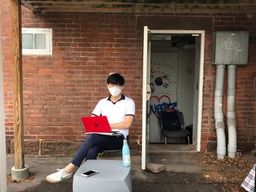
c/o Tanvi Punja, Photo Editor
The Wesleyan Student Assembly (WSA) Textbook Exchange Program (TEP) is adapting to COVID-19 guidelines as it begins its third year of operation on campus. The program will run from Monday, Sept. 7 to Monday, Sept. 14 in the University Organizing Center’s (UOC) parking lot at 190 High Street. The TEP is organized by the WSA Academic Affairs Committee (AAC) which normally collects textbooks from students at the end of each semester to sell the next fall. Due to the pandemic, the TEP has undergone major changes for the fall semester to minimize in-person contact while still fulfilling its mission of allowing students to buy and sell used textbooks at lower prices. The TEP will begin collecting books that students had intended to sell at the end of the spring semester on Sept. 12.
“Even though the pandemic has hit, we’re still available and we are practicing those safety guidelines that Wesleyan has put in place, so it’d be really great if people stopped by and showed interest in the program,” former AAC Chair and current TEP Director of Operations Jake Kwon ’21 said.
Among the changes to the TEP this semester is its relocation from the lobby of Olin Library to the UOC parking lot. Kwon and AAC Chair & TEP Executive Director Ben Garfield ’22 also made the decision to switch to a reservation system. Unlike previous years, where books were available on a first-come, first-serve basis, students who want to purchase books should visit the list of available textbooks, reserve the texts they would like to purchase, and then sign up for a 15-minute time slot for pick up and payment. The time slots accommodate a maximum of seven people at a time to minimize the risk of exposure.
In addition, WSA volunteers will be wiping down books before handing them over to students. Garfield emphasized that volunteers would not be in contact with the books long enough to contaminate them.
“We are wiping the books down…just making them not dusty, because we’re not near the books for long enough that we would be able to get anything on them,” Garfield said. “We’re literally going in, grabbing books out of the thing, and handing them to you right away.”
As of now, the TEP is not available to remote students due to the logistical issues involved with mailing books. However, the University’s library staff have worked to make as many textbooks available online as possible, and Garfield notes that students could possibly receive books through the mail if they can find willing students on campus.
“Books are not an easy thing to ship because you have to find the specific size packaging and we have big textbook-sized books and we have very small books, so we’d have to go figure out the right size packaging for all those things, take the time to do that, then ship them, figure out how much it’s going to cost, and charge the person for the shipping, and so that gets very complicated on our end,” Garfield said. “To remote students…if you need a book really badly that we have, basically what I’d say is ask a friend if they can get it for you and send it to you because it’s just not in our operation right now to be able to do that.”
It is unclear at this point whether or not the book reservation system will remain after COVID-19.
“We really do value the first-come, first-serve basis that we have for students to physically come in and be able to request books, and we don’t want the reservation list to be impeding that process,” Kwon said. “But the reservation list, however, during this time allows us to stay safe and just continue respecting the community guidelines that Wesleyan set up before the semester started.”
Regardless of the impact of COVID-19, Garfield and Kwon hope that students will continue to turn to the TEP as a resource.
“[The TEP] is made for students, by students, and we just want people to know that this program is serving them and it will only flourish and be successful if students continue to engage in this program,” Kwon said.
Hallie Sternberg can be reached at hsternberg@wesleyan.edu or on Twitter @halsternberg.
Molly Meyer can be reached at mkmeyer@wesleyan.edu.